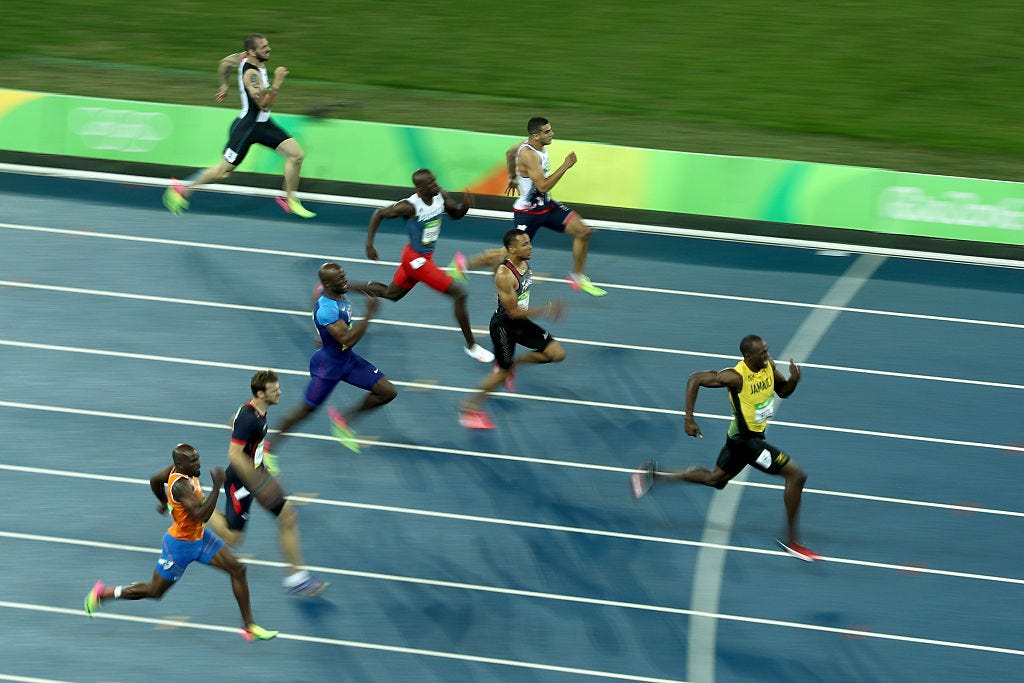|
 |
Olympic Lessons for Our Debates Over Affirmative Action
While the Olympics offers important lessons in the debate over racial and other preferences, there are important differences between judging sprinters and college applicants
With the Summer Olympics opening this week, someone suggested to me it might be a good springboard for a discussion of racial preferences. How we approach competition at the highest levels of sport might shed some light on all the arguments we’re having over the competitions that make a difference for success and happiness in our ordinary lives—such as the competition for college admissions or for jobs.
After all, the Olympics is an event where we expect everyone to compete on equal ground, purely on their own individual abilities, with no special preferences either way. Performance is supposed to be all that matters.
This puts questions about nonmeritocratic preferences in a sharp perspective—but the story is a little more complicated and nuanced than you might expect. We see, for example, people of certain nationalities, or from certain regions, dominating in some sports and struggling in others—which provides us with some interesting lessons about what actually leads to success and how we can encourage it.
The Steel Man Case for Racial Preferences
The Olympics are a kind of pure meritocracy, where standards of achievement are completely equal, and this is guaranteed by the fact that, in most cases, they are objectively measurable. How many seconds does it take you to run 100 meters? If it’s less than everybody else on the track that day, you win, simple as that.
Yet it’s not always quite that simple. There are a few Olympic events where the standards are not strictly quantitative and there is an element of judgment, even of aesthetic taste. In the Summer Olympics, the leading example would probably be rhythmic gymnastics, which combines gymnastic skills with a form of dance. The standards may not be entirely objective, even though they are judged by experts, and there are sometimes cases of bias or outright corruption.
The most memorable scandals have been from the Winter Olympics. Ice dancing—which is less technical and more about aesthetic judgment—has long been roiled by controversy and scandal. This famously impacted figure skating in the 2002 Olympics, when there were allegations that the vote for the gold medal in pairs skating was rigged in favor of the Russians at the expense of a Canadian couple who had clearly performed better. Millions of skating fans were outraged.
And if we’re talking about the Russians, we have to talk about the much larger story of outright cheating through the massive covert use of performance-enhancing drugs. This has actually led the International Olympic Committee to enact a form of national preferences at the Olympics by banning a bunch of Russians for doping. They had no choice, and in fact probably didn’t go far enough. Radical measures are necessary to discourage the Russians from cheating again.
You can see the application of this to our own debates. This is what the “woke” think has been happening all along in every area of life: bias and outright corruption, which has to be counteracted by a bias against the supposed cheaters.
This is what you might call the steel man case for racial preferences, and there is a point to it. Rooting out bias is hard. The counterpoint, however, is that rooting out bias is actually hard. You have to prove it, you have to identify it specifically and you have to figure out what will actually correct the problem, as opposed to what will make people feel good or satisfy the lust for revenge.
In figure skating, the response was a new scoring system with more specific criteria that attempted to make judging more objective. But bias persists, and an economics professor who reviewed 15 years’ worth of scoring data found that “judges from all countries, including the U.S., were more likely to favor their own.” There aren’t any easy solutions.
The Jamaican Sprinter’s Guide to Excellence
The bigger problem for this narrative is that the element of subjectivity in judging is more the exception than the rule, certainly at the Olympics. There are still objective underlying measures of performance, which is what allows us to tell when someone is putting a thumb on the scale in the first place.
More to the point, the Olympics provides many examples of national disparities, where one country or group of countries persistently dominate a particular event in ways clearly not caused by bias. The Jamaicans, for example, are famously at a disadvantage when it comes to winter games like bobsledding—not surprising for a country where it never freezes—yet they dominate in the sprinting events, achieving astonishing success for a nation of fewer than 3 million people.
Some people speculate that this might be due to genetic and environmental factors, but most of the credit seems to go to simply having a good athletic development and training system. To compete at top level takes raw athletic talent, which depends on genetic factors and early experience. But to develop that talent requires training, coaching, a reserve of experience and constant practice from a young age. Countries that do well in a particular sport are those that have good systems for finding young talent and developing it. And when you have a good system, all the athletic talent in the country tends to get filtered into that one sport rather than, say, bobsledding.
In the New York Times, Orlando Patterson sums up the reason for Jamaica’s sprinting success in one word: Champs.
Officially called the Inter-Secondary Schools Sports Association Boys and Girls Athletics Championship, Champs is an annual competition attended by 30,000 wildly enthusiastic fans. Jamaica is perhaps the only country in the world where a track and field meet is the premier sporting event.
But it’s not just Champs. The competition is one part of a broader framework—track and field is huge at every educational level, with periodic regional meets drawing athletes of all ages from the most remote rural areas.
This explains why some nations consistently do better at certain sports and can also explain racial disparities within countries. Until recently, there were few well-known Black tennis players, golfers and gymnasts, simply because these sports were not as readily available to young people in Black communities, so the best and most driven young athletes were directed into other activities, such as basketball.
The Olympics and Middle School Algebra
There is a big lesson here for those concerned about racial equality in the U.S. Racial preferences for admission to elite universities, for example, are a solution to the wrong problem—like trying to pass out track and field medals to make up for unequal results that come from differences in training and support 15 or 20 years earlier.
We are trying to preserve racial preferences for college admissions at the same time that some urban school districts are canceling middle school algebra classes. How do we expect these kids to get into MIT, or keep up once they get there, if they didn’t get the training they needed in math when it really mattered? The problem isn’t what happens when kids apply to college, it’s what’s not happening long before they get to that point.
If you want world-class sprinters, do what the Jamaicans do: Start training all your kids at track and field early, pour resources and organization into it and make sure what you’re doing is actually effective. If we want more women and minorities in STEM fields, or more minorities studying at elite colleges, we need to do the same.
The idea that disparities are “systemic” is a common “woke” claim. But it is usually invoked to tear down an existing system, while building up a new system—a Champs but for academic performance—is a much more difficult task.
And Orlando Patterson offers a warning. Why, he asks, has Jamaica not achieved the same level of excellence in its economy?
Political and economic successes are often top-down, relying on leadership that adapts and manages appropriate institutions that also benefit the non-elite. But things like health reform and sports success—and the reggae industry, for that matter—are largely bottom-up.
He adds that one of the keys to Jamaica’s athletic success is its culture of “combative individualism,” which “dovetails nicely with running, in which performance is entirely up to the athlete.”
If individuals benefit from good systems, they also are the ones who have to build and maintain those systems and do the work to excel within them. There is a lot that cannot be done from the top down.
Swifter, Higher, Stronger
There is one final lesson to be drawn here, and it’s about the way in which the Olympics is profoundly different from the rest of life. In the Olympics, there are a limited number of medals, and only a few people are going to get them. That’s where this analogy reaches its limit.
Too much of our debate over racial preference in America is put in competitive, zero-sum terms—as if one person getting ahead means somebody else has to fall behind. And then we wonder why the issue provokes so much resentment on both sides. High achievers who can’t get into elite schools are supposed to blame it on racial preferences, while Black and Hispanic kids trying to get ahead are supposed to resent the “legacy admissions”—white kids from well-off families—who are supposedly keeping them out. But often the scarcity is artificial, and there’s no reason the game has to be zero-sum.
In the real world, there is no inherent reason why everyone can’t rise to a higher level of achievement and make their lives better. This means we should be less focused on the exact results and more focused on providing the skills that will help everyone achieve.
We should conceive of this less as a game in which one person loses if another wins and instead look at it as a race to the top in which everyone can improve, going swifter, higher, stronger—which, come to think of it, is supposed to be the underlying spirit of the Olympic Games.
You’re currently a free subscriber to Discourse .

